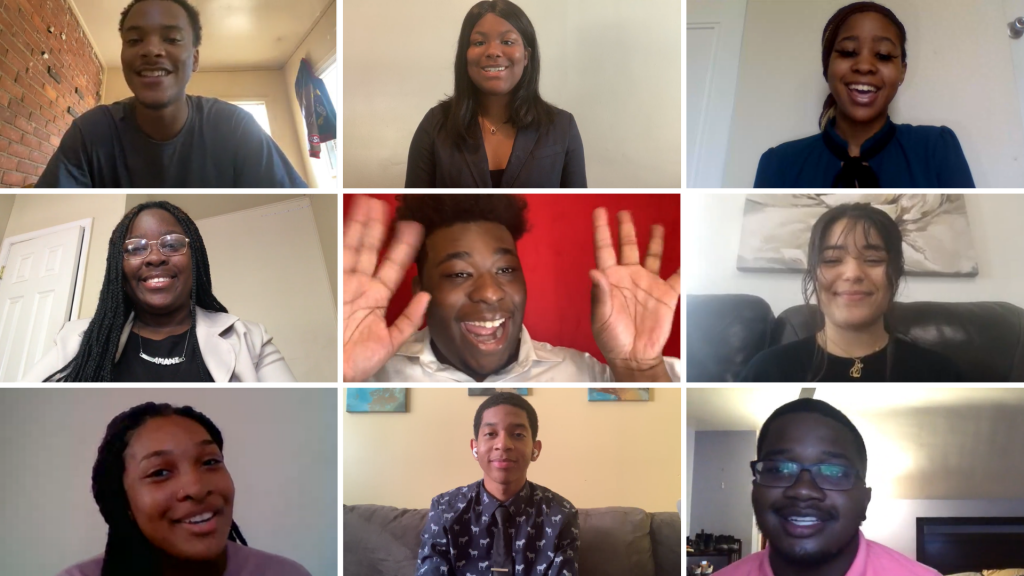
By Eshauna Smith, CEO
When you imagine your first job growing up, you think about earning a paycheck, befriending coworkers, receiving a uniform/badge/business card with your name on it. None of us ever imagined our first job would be completely virtual, sitting at home in front of a computer waving at our coworkers over Zoom.
But that’s exactly the experience the Urban Alliance Class of 2020 had when COVID-19 forced our organization to convert our workforce development program to an online format. Urban Alliance seeks to level the playing field for young people of color by opening the door to economic opportunity through paid internships, job skills training, and mentoring. For our students, their Urban Alliance internship is most often their first-ever job.
In this strange, liminal state in which we now exist, our students had to master new skills; juggle school, family, and work obligations; and do it all during a time unlike any we’ve ever seen. And the Urban Alliance team had to remain a step ahead of them while navigating the same new and scary world — because we committed to ensuring that the global pandemic would not stop our students from earning or learning.
Some 80% of our students rely on their paychecks to contribute to household expenses — and those paychecks became an even more critical source of income during this economic downturn. Shuttering the program was never an option.
At the outset, we focused primarily on student needs — 1) Do our students have access to the technology needed to work remotely? 2) What other supports (housing, food, healthcare, mental health, etc.) do our students need and how can we help connect them? 3) What training do our students need to successfully work remotely?
After ensuring that all students were safe, healthy, and connected, we set about reimagining our program even as we continued to run it — building the plane while flying. Employer by employer, we determined which students’ roles could easily convert to digital work and which students needed alternate options. Lesson by lesson, we converted our interactive, in-person skills training into online modules designed to accommodate our full cohort across all five regions in which we work. Assignment by assignment, we modified our project-based learning to ensure students were being matched with work that developed the digital literacy skills needed for our new normal.
After each new experience, we debriefed, readjusted, and improved. In new cross-functional working groups, we encouraged collaboration and innovation regardless of job title so that teams could learn from one another each step of the way, making real-time course correction possible. For every plan we finalized, there were innumerable previous incarnations as we wound our way to a workable solution.
Our program year culminated in a completely new final project. We turned our annual in-person Public Speaking Challenge into a Virtual Interview Challenge, teaching students how to complete job interviews in a virtual environment and celebrating their successes via Zoom and YouTube rather than with hugs and high-fives. In all, we graduated over 450 students from the Class of 2020 — all of whom continued to earn and learn — and were connected to post-high school pathways to economic mobility.
By that point, George Floyd’s death had reignited the Black Lives Matter movement for racial equity, and we were all reminded why we do this work. Young people of color do not have access to same kinds of workplace opportunities, professional networks, and skills training that their white peers do. Programs like Urban Alliance are needed to bridge that gap and build a more diverse and equitable future workforce. When the world continues to oppress youth of color at every turn, they need people in their corner more than ever.
Though we may be tired and heartsick over the state of the world, we never once considered slowing down. Instead, we took the month in between the end of our program year and the start of the new school year to completely reimagine our program yet again.
Whether we end this school year with students and businesses all back to in-person operations or not, remote work isn’t going anywhere. To be successful in any future job, our students must be equipped with the tools and knowledge to work from anywhere, anytime.
With that in mind, we reconceptualized our six-week pre-employment professional skills training bootcamp to prioritize the soft skills and digital literacy needed for adaptable, successful future work. Students will now train for the entire fall semester and begin remote or in-person (depending on local restrictions) internships in January 2021. And this time around, the entire experience will be hosted through a brand-new online platform to make skill development easier than ever for students.
We’re fortunate to have sustained 375 of our usual 500-plus internship opportunities going in to this new program year — even during a global pandemic. Right now, we have launched our first training workshops in Chicago even as we continue to reformulate the curriculum for later sessions. The load is still heavy, and we’re still tired, but there’s no way we’re stopping.
Our students deserve the same access to opportunity that we’ve provided the 5,700 students who came before them — and they’re going to get it. Though their first job will look much different than they ever expected, we’re here to ensure that it is no less rewarding, motivating, eye-opening, and transformative.
Eshauna Smith is the CEO of Urban Alliance.